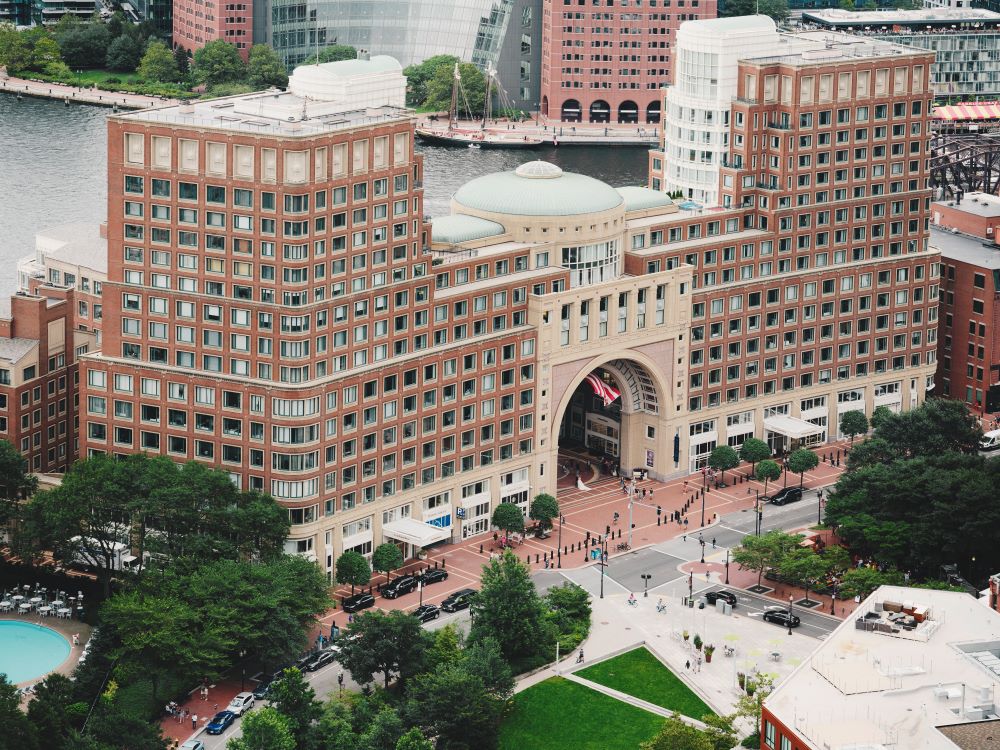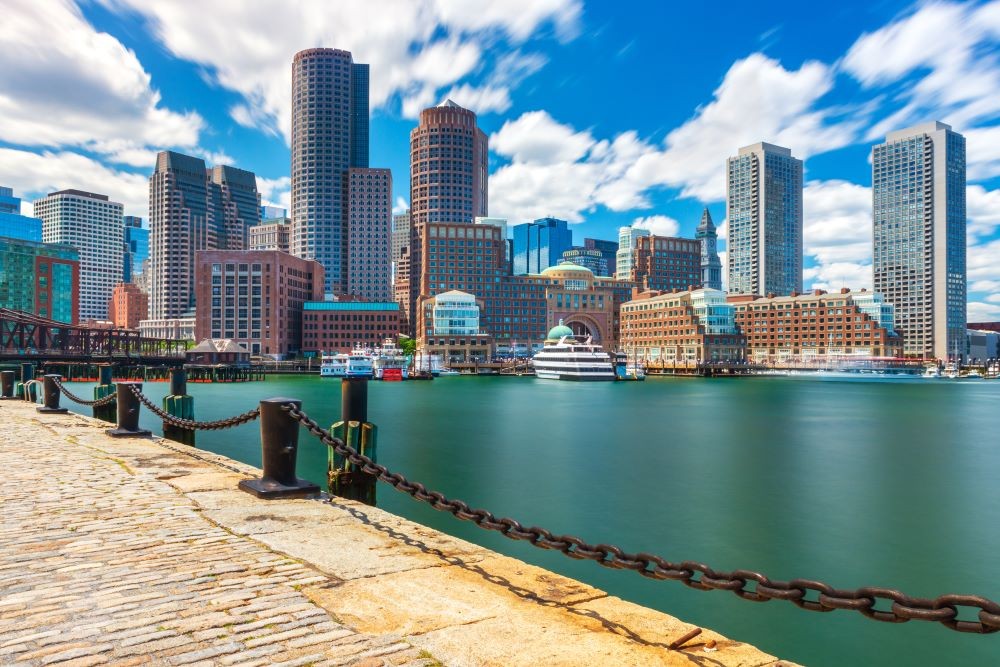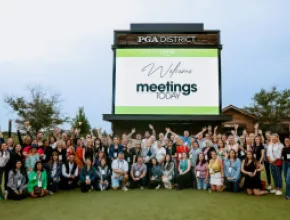While Boston might be famous for its history, meeting planners should note its progressive thinking around sustainability as the issue becomes more prominent and important within organizations.
“Sustainability is critical to every aspect of what we do at Meet Boston,” said Martha J. Sheridan, president and CEO of Meet Boston. “From leisure visitations to meetings and conventions, our partners are all focused on how we travel and execute events responsibly. Particularly in Boston, a hub of innovation where the impact of climate change is acute, we want to be that leading resource and advocate for how the travel industry can adopt best practices and foster new solutions.”
The city is attracting events that are putting sustainability front and center, too. C40 Cities, a global network of mayors working to combat the climate crisis, recently worked with Boston’s Mayor Michelle Wu to bring together city staff from U.S. and Canadian cities to share knowledge on sustainable transport and learn from leading examples in Boston.
“Boston is an example of how many North American cities are tackling climate with a Green New Deal approach, putting equity and environmental justice at the forefront of our climate work,” said Emma Tavolieri, policy advisor to Oliver Sellers-Garcia, the director of the Boston Green New Deal. “Generally, the feedback [from the event] indicated that Boston is ahead of the game with developing clear and simple goals, and also developing mechanisms to help track these goals, including the City’s public-facing Green New Deal Dashboard.”
From the hotels and offsite venues to creative solutions and valuable partners, here’s how you can begin to green your meeting in Boston.
Hotels for Sustainable Events in Boston

A number of hotels in Boston are positioned well to host greener meetings and are reporting increased interest from planners in working with them to bring sustainable practices to the fore.
At Boston Harbor Hotel, a AAA Five-Star luxury property, Rachel Stiglets, director of catering, is seeing planners incorporate green initiatives into their programming, even in venue selection. The LEED Gold-certified property runs single-steam recycling, which is a big draw for events, plus other initiatives.
“On the meeting side we are seeing a lot of requests for our green initiatives,” she said. “The hotel is centrally located and accessible by bus, train or boat, which is a huge draw to promote public transportation. We have electric charging stations and bike storage available on our property.”
She’s also seeing clients take the initiative to bring sustainability even further at their events at the hotel.
“We’re also seeing an increase in paperless events, where event hosts create an app to supply attendees with all necessary information for the conference. When clients are making a swag bag or giveaway, we see an effort to ensure it is of high quality and made of all recycled products,” she said. “We’re also seeing clients providing attendees with the option to opt out of bags to reduce waste. Additionally, there is an interest in locally sourced and eco-friendly packaging. If companies are hosting a multi-day event, a quality reusable water bottle or coffee mug is a great offering.”
At 1,060-room Hilton Boston Park Plaza in historic Back Bay, sustainability is becoming increasingly important to meeting planners and attendees, too, with F&B being a major focus.
“Sustainable foods and products, recyclable options and eliminating single-use plastics is on every planner’s radar,” said Chris Shimkus, director of food and beverage for the property. “Sourcing local produce and partnering with local farmers, depending on the season, leaves less of a carbon footprint. Even with seafood, we are now in a day and age where we can track our seafood not only to what waters it came from, but from what boat. Wine is even becoming more environmentally friendly as well with organic, biodynamic and sustainable wine options, including keg wine for less waste, and local craft cocktails/mocktails always go over very well at events.”
[Related: The Old and New Boston Venues and Experiences That Will Keep Groups Coming Back]
Offsite Venues for Sustainable Events in Boston
Hotels aren’t the only venues that can work with your event on sustainability.
Fenway Park is arguably one of the most iconic venues in town. The historic ballpark, home to the Boston Red Sox, actually has an urban rooftop farm onsite that yields more than 5,900 pounds of produce a year.
The 5,000-square-foot, organic Fenway Farms is managed by Green City Growers and the produce harvested is used in restaurants and concessions within the park. The Vineyard Vines Event Deck at the park is a special events venue inspired by Fenway Farms that also grows fresh produce that is donated to the community.
Host an event at the New England Aquarium in Boston and you’ll be supporting marine conservation, rehabilitation and research projects in the North Atlantic. With scenic views of Boston Harbor and a backdrop of ocean animals, events for a variety of sizes can be held in numerous spaces throughout the aquarium.
Working With Meet Boston
The Destination Services team at Meet Boston also can help groups achieve their sustainability goals. One unique program the team introduced recently is converting street pole banners into shoulder bags for event organizers. Meet Boston partners with Accent Banner on this project to help make it financially feasible, too.
In 2023, 12 groups took advantage of this program, where eight poles with two banners each yielded 16 bags per group, ranging from clients like Diversified Communication to associations such as American Academy of Neurology. In 2024, Meet Boston reports that 16 groups are participating in the program.
“The bags are a great gift for our clients after the meeting because they are made from the banners that we designed/hung for them and [they’re] a great memory of the successful meeting they had in Boston,” remarked Lisa Deveney, vice president, destination services, meetings and events for Meet Boston.
[Related: 5 Sustainability Trends in the Conventions Industry]
Event Partner Spotlight: Green Your Events With TripZero

Headquartered just outside of Boston in Concord, Massachusetts, is TripZero, a company with a mission to address the large carbon footprint created by travel and business events by measuring and offsetting the carbon footprint created by their customers’ travel—for free.
TripZero was launched in 2014 after founder Eric Zimmerman turned his home into a carbon-positive house but realized that he wasn’t making much of a dent—his travel to and from conferences and events were having a major, negative impact on his overall carbon footprint.
Soon after, TripZero was born, initially as an online travel agency. Within weeks, it quickly caught the attention of conference organizers, and today, 100% of its business is conferences, events, festivals, incentive trips and other forms of group travel. TripZero sources hotels for groups (claiming to save attendees 25%-30% with discounted room blocks) and then works to offset their travel carbon footprint and support other sustainability initiatives at no cost.
For planners, TripZero is a valuable resource, especially if they are new to sustainability.
“Event organizers are in different places in this sustainability journey,” Zimmerman said. “And a lot of them are really just beginning it. Sustainability has gone from being priority No. 18 to now in the top three or five. But often the event organizer was handed that as a priority without a lot of direction.”
How Does TripZero Work?
“Typically, event planners involve us at a pretty early stage. They know when they plan to hold their events and what they’ll look like, but they haven’t decided on a destination yet. We spend considerable time understanding a client’s event and what’s important to [their] organization and attendees,” Zimmerman explained. “With that knowledge in-hand, we develop a detailed RFP and conduct a location site search for the client that enables them to get a bird’s-eye view on availability and approximate costs.
“We run a robust RFP and vetting process on the client’s behalf. In the process we work with DMOs, like Meet Boston, convention centers, hotels, theaters, you name it,” he continued. “Once a client has chosen a destination, we collaborate with them to produce first-rate and fair contracts with hotels and venues.”
Then, Zimmerman says, the fun starts, and TripZero flexes its skills as a sustainable housing agency, educating the client about the carbon footprint created by travel and how they can mitigate that through carbon offsetting.
“We purchase certified carbon offsets that help finance some remarkable carbon projects that either prevent CO2 emissions or cause CO2 to be reabsorbed from the atmosphere,” Zimmerman said. “Over the years, we’ve helped finance everything from solar power projects in India, to reforestation projects in Chile, to methane reduction projects on dairy farms here in the United States.”
TripZero will create booking portals that are designed to keep attendees engaged and sell out room blocks.
“We manage room blocks with great care and typically sell them out—I don’t think we’ve ever had a client pay attrition for unsold rooms,” he added.
Case Study: NESEA in Boston
Being headquartered in the Boston area, TripZero has some great rapport with Boston-based events (though you can work with TripZero to source your event in the U.S. and internationally). One long-time client that showcases the capabilities of TripZero as a collaborative event partner is Northeast Sustainable Energy Association (NESEA)’s BuildingEnergy Boston event at Westin Boston Seaport. The conference is designed by and for practitioners in the fields of high-performance building and design, energy efficiency and renewable energy and brings more than 1,000 people together to learn and share ideas.
TripZero has been working with NESEA since 2015, and they’ve now been at the Westin for a number of years. Throughout their partnership, TripZero’s role with NESEA has evolved.
“Over the years, they've engaged us, and we've engaged them in pushing the envelope on what we do as it relates to onsite sustainability,” Zimmerman said. “They’ve collaborated on F&B solutions such as promoting plant-based menus and deemphasizing meat; discovered and tapped local organizations such as Rescuing Leftover Cuisine to reduce food waste and Save That Stuff to aid with recycling streams; worked to eliminate all single-use plastics; and even experimented this year with a carpooling app to minimize cars on the road for local attendees.
“I'm delighted to see sustainability now being such a priority for people. Now, we're in the execution and deploy mode,” Zimmerman said. “And I think as people achieve success on various initiatives, they're going to see the positive feedback that they get from their attendees, or from their management team or their board of directors. And they're going to want to do more, which is great.”







